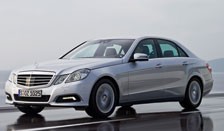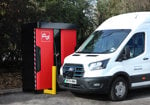A slump in new car sales and the weakening of the pound against other key global currencies is forcing car manufacturers to raise prices of new models.
At a time when the new car market is suffering a protracted and deep fall in demand
(down 28% year-to-date), raising prices may seem a strange decision to make, but many car manufacturers are buying vehicles from abroad (primarily Germany, France and Japan) and are exposed to currency fluctuations.
With the pound now worth 1.08 euros (1.28 in October 2008 – its highest for the past 120 days), and 137 yen (189 in September 2008), the price manufacturers are paying for new cars is also rising.
Many of the price increases have been timed to arrive at the beginning of April, thus missing the crucial March registration plate change.
The ramifications are widespread, with the rises leading to increased contract hire and daily rental rates, as well as more expensive benefit-in-kind tax bills for company car drivers.
Here, we ask the major car manufacturers about their plans for price rises in the UK over the next few months.
Alfa Romeo
Increased prices on February 1, but not all models affected.
The 147 range rose by an average of £750, the GT by £1,000 and the Brera/Spider models rose by £1,500.
Audi
Introduced an average rise of 2% across the board on February 23.
Audi is also due to make some specification changes to its range in April which ‘may have an impact on prices’, according to a spokesman.
BMW
Announced average rises of between 1.5 and 2% in February. Usually has one or two price rises a year, with the next scheduled possibly for September.
Chevrolet
Hasn’t raised prices this year, and has no plans to thanks to it being aligned to the South Korean won, which is proving more stable in terms of currency
fluctuation.
Citroën
Had a series of phased price rises in January and February, which averaged out at a 3.5% rise across all model ranges.
Fiat
Increased prices across the board by an average of 2.1% in January, and says that there will possibly be another round of increases in the middle of the year, although could not
confirm this.
Ford
Announced an average increase of 4.7% on February 1. At the time, it warned that if the current situation continues with the pound being worth much less against the euro than before, then further rises will be possible. A spokesman said Ford was ‘holding off’ on this for as long as possible.
Honda
Prices will rise by an average of 3% across the model range with effect from April 1, its first pricing action of the year.
Hyundai
Has ‘no plans’ to raise prices, but says it is watching the market closely. Hyundai hasn’t raised prices this year, although its next price list is due in July.
Jaguar
Has no plans for any price rises this year.
Kia
Announced a price freeze in January, although market conditions and currency fluctuations mean that it is likely to raise prices with effect from April 1.
Land Rover
Land Rover is currently offering large price reductions on certain models, with up to £7,500 off a top-spec Discovery and up to £5,000 off a range-topping Freelander.
The company hasn’t increased prices this year, although it may make a ‘price alignment’ at the start of April.
Lexus
An average 2% price increase will become effective from April 1.
Mazda
Prices of the Mazda5 MPV and Mazda6 upper-medium model will be increasing by 2% from April 1, representing an average increase of £323 and £345
respectively.
Mini
Planning a price increase at the end of March, although the details have yet to be finalised.
Mercedes-Benz
Will announce its first price rises of the year on April 1, although not all models will be affected.
However, it is reversing the general trend by cutting costs on its new E-Class saloon and Coupé ranges, which go on sale in June. Saloon prices will drop by between 10 and 14% across the range, while the new Coupé will cost around £1,000 less than the equivalent CLK model it replaces.
Mercedes-Benz is also due to announce similar price cuts on its C-Class range.
Nissan
Will raise prices by an average of 3.4% from April 9, although some models will escape any increase.
Peugeot
Announced a 2.5% average increase across the board in January, and is considering further rises in April.
Renault
Average price rise for February was 2%, spread across the whole car range (Laguna was 1.1% and Clio 3.3%). For March, only the new Mégane is affected and rose 4.9% due to it being the most recent model range launch.
Saab
Hasn’t raised prices so far this year, although a spokesman said there may be some pricing action soon.
Seat
Will increase prices by an average of 3.4% from April 1.
Skoda
Raised prices by an average of 2.1% across the board in January. Has no plans for further imminent rises.
Toyota
An average 4.2% price rise was announced on February 27 and this applies to the iQ, Yaris, Avensis and Prius models.
Vauxhall
Announced an average increase of just under 5% in February, but a spokesman said it was ‘impossible’ to predict if there would be any further rises in thefuture and that the company would ‘continue to monitor the situation’.
Volkswagen
Announced price rises of between 1.5 and 5% across all models in the range earlier this month and has ‘no plans’ to increase prices again.
Volvo
Hasn’t raised prices this year, and at present has nothing planned for future rises, although it will keep a close eye on the market.
















Login to comment
Comments
No comments have been made yet.